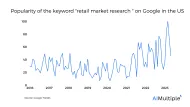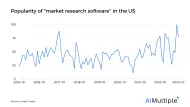B2B Marketing Survey: An In-Depth Guide in 2024
A recent survey on ~3,500 B2B decision-makers shows that more than 40% indicate e-commerce as the most potent sales route, followed by in-person and video content.1 Conducting surveys with B2B decision-makers and buyers is crucial to get such insights. Business-to-business (B2B) marketing surveys have become essential for companies looking to better understand their target market, competitors, and customers. By conducting B2B market research, businesses can:
- Optimize their marketing strategies
- Increase sales
- Maintain their competitive edge.
This article explains the essentials of B2B marketing surveys, their benefits, and the best practices to consider.
What is a B2B marketing survey?
B2B marketing surveys are one of the market research methods designed to collect data from businesses rather than individual consumers, as in B2C (business-to-consumer) surveys. As an essential part of B2B marketing strategy, they usually target decision-makers, such as executives, managers, or procurement officers.
Creating an effective B2B marketing survey involves:
- Defining clear objectives
- Targeting the right respondents
- Crafting relevant and concise questions
- Choosing an appropriate survey format.
After implementing the survey, companies analyze the collected data to identify trends, patterns, and actionable insights to enhance their marketing efforts and customer relationships.
If you are looking for a market research software, you can check out our vendor deep dive.
Differences between B2B and B2C market research
Before diving into B2B marketing surveys, it’s crucial to understand the distinctions between B2B and business-to-consumer (B2C) market research.
Customer base/Market size
B2B market research focuses on a more narrow and specialized target audience, consisting of other businesses, whereas B2C market research targets individual consumers.
Decision-making process
B2B decision-making typically involves multiple stakeholders and longer sales cycles, while B2C decisions are often made by individual consumers.
Relationship focus
B2B relationships are typically long-term and built on trust, whereas B2C relationships are more transactional and shorter-term.
Metrics and KPIs
B2B market research focuses on metrics like ROI, customer lifetime value, and lead generation, while B2C research emphasizes customer satisfaction, brand awareness, and purchase intent.
Why are B2B marketing surveys important?
This valuable data gathered from B2B market research help:
1.Identify customer needs and preferences
Source: McKinsey
Figure 1. The top 5 demands of B2B customers from suppliers
Research shows that ~85% of customers see access to technical content as essential information suppliers must provide.2 B2B marketing surveys help businesses understand what customers value most, enabling them to tailor their products, services, and marketing efforts accordingly. This ensures that businesses can effectively meet customer expectations and demands.
2.Evaluate product and service quality
According to a Gartner survey, ~80% of B2B buyers have had difficulty with their latest purchase.3 By gathering customer feedback, businesses can assess the quality of their products and services. This information can be used to identify areas for improvement, leading to better offerings and increased customer satisfaction.
3.Measure customer satisfaction
A Deloitte survey conducted on B2B buyers shows that ~50% of customers face difficulty searching for basic supplier information.4 B2B marketing surveys can measure overall customer satisfaction and satisfaction with specific aspects of a company’s products or services. Tracking satisfaction levels over time can help businesses identify trends and address potential issues before they escalate.
You can also check out our vendor benchmark on the available customer survey software in the market.
4.Understand market trends and opportunities
B2B marketing surveys can provide insights into emerging market trends, enabling businesses to adapt their strategies and stay ahead of the competition. They can also help identify new market opportunities or potential customers, such as unmet customer needs or underserved segments.
For instance, research shows that companies that sell using distinct channels have a bigger market share.5 By understanding emerging channels, companies can invest in them, such as ads on web searches, and can increase their visibility.
Check out our article on the market research statistics to learn more about current market research trends.
Source: McKinsey
Figure 2. The increase in the number of channels in B2B customer business research.
5.Assess marketing effectiveness
By surveying customers, businesses can gauge the success of their marketing strategies and tactics. This information can be used to refine marketing efforts, allocate resources more effectively in creating marketing campaigns, and ultimately achieve better results.
For instance, research shows that personalized marketing strategies lead to a larger market share (See Figure 3).
Source: McKinsey
Figure 3. Market share move by companies implemented personalized marketing strategies or not.
6.Strengthen customer relationships
B2B marketing surveys demonstrate to customers that their opinions and feedback are valued. This can help build trust and foster long-lasting relationships, which is crucial to improve customer retention and loyalty in the B2B space.
7.Inform decision-making
The insights gained from B2B marketing surveys can help businesses make informed decisions about product development, marketing strategies, pricing, and more. This data-driven approach to decision-making can lead to better outcomes and improved business performance.
8.Monitor competitor performance
Surveys can help businesses monitor their competitors by gathering information about customers’ perceptions of competitor offerings and comparing them to their products and services. This can help identify areas where a company has a competitive advantage or needs improvement.
B2B marketing survey best practices
1- Establish concrete goals
Define the strategic purpose of your B2B marketing survey, whether it is to assess customer sentiment, uncover market opportunities, or benchmark competitor performance. A clear goal is a basis for targeted survey design and in-depth analysis.
2- Pinpoint key stakeholders
Ascertain the most relevant decision-makers within your target businesses, such as C-suite executives, department heads, or procurement specialists. Intelligent segmentation ensures your survey reaches individuals with the authority and expertise to provide valuable insights.
3- Create relevant questions
Create survey questions that delve into your survey goals while avoiding cognitive overload. To capture multiple opinions, use a variety of question formats such as Likert scales, open-ended responses, and ranking tests.
For more on the best practices of online surveys, check out our article.
4- Streamline survey length and flow
Condense your survey to a succinct yet comprehensive format, ideally within a 10-15 minute completion timeframe. Strategically sequence questions, employ thematic divisions and provide intuitive navigation to enhance the user experience.
5- Guarantee data integrity and confidentiality
Communicate your commitment to safeguarding respondent privacy and ensure adherence to pertinent data protection regulations. Uphold transparency by disclosing your data utilization policies and maintaining a secure survey environment.
6- Cultivate respondent motivation
Foster participation by offering tailored incentives, such as exclusive industry reports, early access to new products, or discounted services. Convey the benefits of participation and follow through on incentive delivery.
7- Leverage cutting-edge survey technology
Use a feature-rich survey platform for easy distribution, data gathering, and analysis. To meet the needs of today’s on-the-go professionals, make sure your survey is optimized for mobile devices.
8- Employ a multichannel distribution strategy
Engage your target audience through various channels, including personalized email invitations, LinkedIn InMail, industry forums, and targeted social media ads. A diversified approach increases the likelihood of reaching your desired respondents.
9- Synthesize actionable intelligence
Thoroughly analyze the collected data to prepare market research reports which uncover trends, anomalies, and correlations that yield actionable insights. Translate your findings into strategic recommendations, and incorporate them into your marketing initiatives to drive tangible results.
For those interested, here is our guide on customer feedback analysis.
Check out our data-driven list of market research tools.
Here is also our data-driven list of survey participant recruitment services and survey tools.
Further Reading
- Qualtrics Survey Competitors
- SurveyMonkey Audience Alternatives
- Pollfish Alternatives
- MTurk Survey Participant Recruitment Alternatives
Reach us if you need assistance in creating surveys:
External Links
- 1. “B2B Pulse: Insights from our latest global survey.” McKinsey. March 16, 2021. Retrieved March 31, 2023.
- 2. “Customer Experience enters the B2B battlefield” (PDF). Deloitte. Retrieved March 31, 2023.
- 3. “The B2B Buying Journey.” Gartner. Retrieved March 31, 2023.
- 4. “Customer Experience enters the B2B battlefield” (PDF). Deloitte. Retrieved March 31, 2023
- 5. “The new B2B growth equation.” McKinsey. February 23, 2022. Retrieved March 31, 2023.

Cem has been the principal analyst at AIMultiple since 2017. AIMultiple informs hundreds of thousands of businesses (as per similarWeb) including 60% of Fortune 500 every month.
Cem's work has been cited by leading global publications including Business Insider, Forbes, Washington Post, global firms like Deloitte, HPE, NGOs like World Economic Forum and supranational organizations like European Commission. You can see more reputable companies and media that referenced AIMultiple.
Throughout his career, Cem served as a tech consultant, tech buyer and tech entrepreneur. He advised businesses on their enterprise software, automation, cloud, AI / ML and other technology related decisions at McKinsey & Company and Altman Solon for more than a decade. He also published a McKinsey report on digitalization.
He led technology strategy and procurement of a telco while reporting to the CEO. He has also led commercial growth of deep tech company Hypatos that reached a 7 digit annual recurring revenue and a 9 digit valuation from 0 within 2 years. Cem's work in Hypatos was covered by leading technology publications like TechCrunch and Business Insider.
Cem regularly speaks at international technology conferences. He graduated from Bogazici University as a computer engineer and holds an MBA from Columbia Business School.
To stay up-to-date on B2B tech & accelerate your enterprise:
Follow on

Comments
Your email address will not be published. All fields are required.